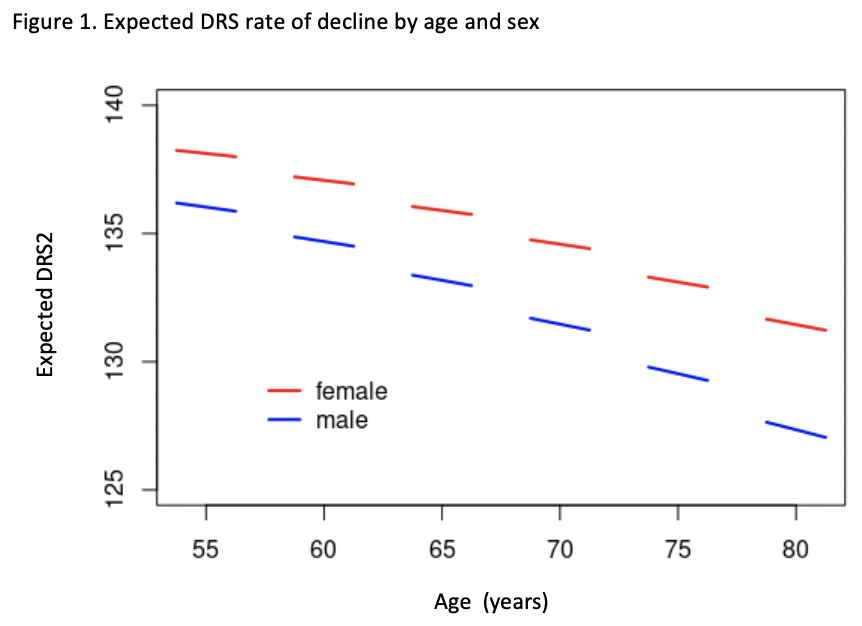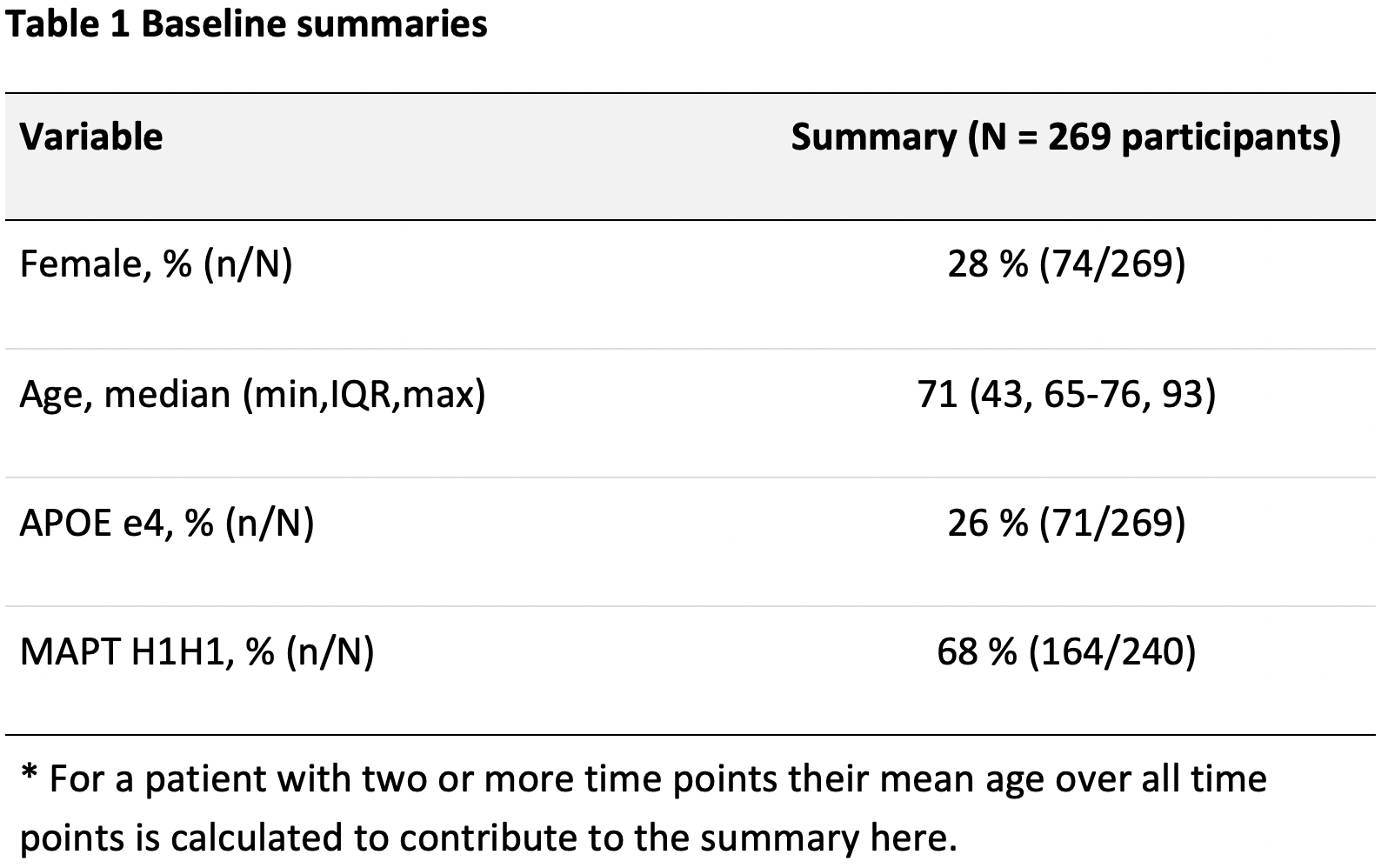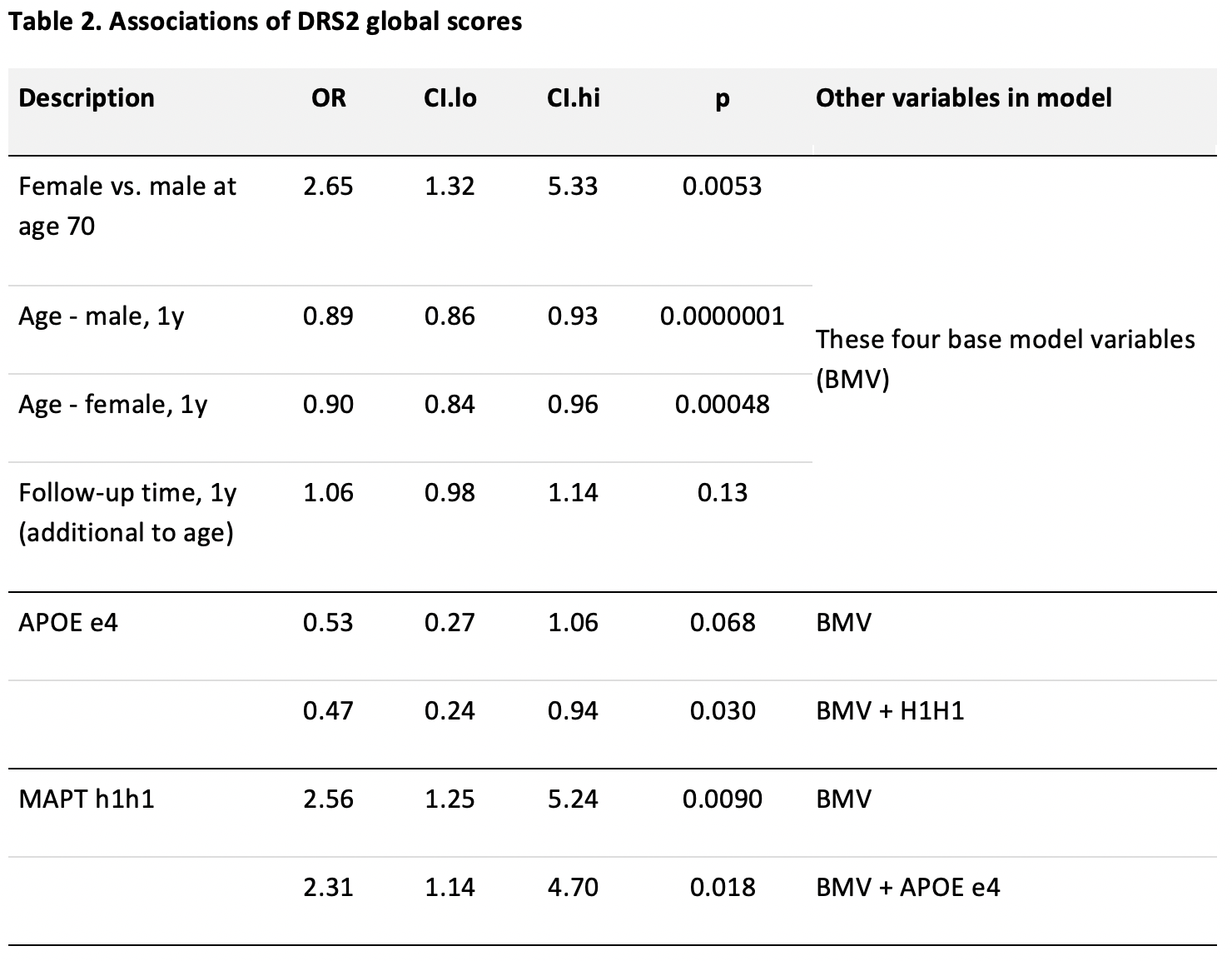Category: Parkinson's Disease: Cognitive functions
Objective: The objective of this study was to identify predictive factors of cognitive decline in patients with Parkinson’s disease (PD).
Background: Among those with PD, 27% have mild cognitive impairment (PD-MCI) most often involving a single non-memory domain [1]. PD-MCI may progress to dementia (PDD) and efforts are underway to identify predictive factors of cognitive decline in PD. Alzheimer’s disease (AD) pathology has been associated with PD-MCI [2]. Recently, an AD genetic risk variant was associated with early cognitive decline in PD [3].
Method: We reviewed medical records of 1028 patients with PD [4]. Of these patients, 269 underwent cognitive testing using the Dementia Rating Scale-2 (DRS2). [table1] We fit proportional odds models with patient specific random effects to estimate odds ratios for higher versus lower cognition scores in association with age, sex, the interaction of age and sex and follow-up time. Fitted DRS2 global scores were calculated from the base model for graphic illustration of the impact of age and sex on DRS. We then added presence of the APOE e4 allele and/or MAPT H1/H1 haplotype into these models to investigate any further associations.
Results: We found higher DRS2 scores in females compared to males with an odd ratio of 2.65 (95% CI: 1.32 – 5.33, p=0.0053) at age 70. We also found decreasing DRS2 scores with an increase in 1 year of age in both males (OR 0.89, 95% CI: 0.86 – 0.95, p<0.0001) and females (OR 0.90, 95% CI: 0.84 – 0.96, p=0.0005) without a significant difference between the sexes. [figure1] These findings were not significantly impacted by APOE allele or MAPT haplotype status. [table2]
The presence of ≥1 APOE e4 allele was associated with lower DRS2 scores reaching significance only in the model adjusted for MAPT haplotypes (OR 0.47, 95% CI: 0.24- 0.94, p=0.030). Cognitive scores were higher for those with the MAPT H1H1 haplotype (OR 2.56, 95% CI: 1.25 – 5.24, p=0.0090).
Conclusion: Our findings demonstrate heterogeneity in PD cognitive phenotypes. In particular, cognitive scores tend to be higher in females though with a similar rate of decline as males. Cognitive scores were lower in those with an APOE e4 allele, but surprisingly better in those with the MAPT H1/H1 risk haplotype. Our findings and others [3], suggest that there are likely additional genetic factors that modify the risk of PD-related cognitive decline. We plan to expand this approach to cognitive subdomains.
References: 1. Litvan I, Goldman JG, Tröster AI, et al. Diagnostic criteria for mild cognitive impairment in Parkinson’s disease: Movement Disorder Society Task Force guidelines. Mov Disord. 2012;27(3):349-356. doi:10.1002/mds.24893 2. Knox MG, Adler CH, Shill HA, et al. Neuropathological Findings in Parkinson’s Disease With Mild Cognitive Impairment. Mov Disord. 2020:1-7. doi:10.1002/mds.27991 3. Sampedro F, Marín‐Lahoz J, Martínez‐Horta S, Pérez‐González R, Pagonabarraga J, Kulisevsky J. CLU rs11136000 promotes early cognitive decline in Parkinson’s disease. Mov Disord. January 2020:mds.27949. doi:10.1002/mds.27949 4. Konno T, Deutschländer A, Heckman MG, et al. Comparison of clinical features among Parkinson’s disease subtypes: A large retrospective study in a single center. J Neurol Sci. 2018;386:39-45. doi:10.1016/j.jns.2018.01.013
To cite this abstract in AMA style:
P. Tipton, N. Bulbul, J. Crook, O. Ross, Z. Wszolek, N. Ertekin-taner. Investigating Factors Contributing to Parkinson’s disease-related Cognitive Decline [abstract]. Mov Disord. 2020; 35 (suppl 1). https://www.mdsabstracts.org/abstract/investigating-factors-contributing-to-parkinsons-disease-related-cognitive-decline/. Accessed December 29, 2025.« Back to MDS Virtual Congress 2020
MDS Abstracts - https://www.mdsabstracts.org/abstract/investigating-factors-contributing-to-parkinsons-disease-related-cognitive-decline/



